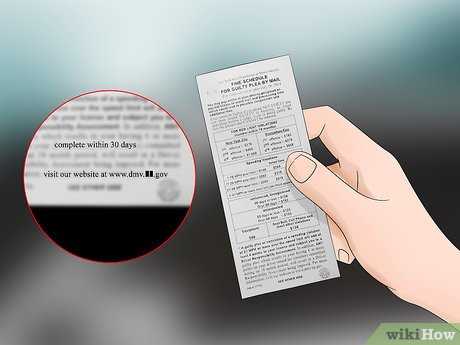Last Updated on February 15, 2024 by Vadym

When it comes to getting a ticket for window tint violation, many drivers wonder if it will go on their record. The answer to this question depends on several factors, including the state in which you received the ticket and the specific circumstances of your case.
In some states, a window tint ticket is considered a non-moving violation, which means that it does not affect your driving record. Non-moving violations typically include infractions that do not involve the actual operation of a motor vehicle. These types of violations may include parking tickets, equipment violations, and certain administrative offenses.
In other states, a window tint ticket is considered a moving violation. This means that it is related to the operation of your vehicle and can have an impact on your driving record. Moving violations typically include offenses such as speeding, running a red light, and reckless driving. If a window tint ticket is classified as a moving violation in your state, it will likely result in points being added to your driving record.
It’s important to note that even if a window tint ticket does not go on your driving record, it may still have other consequences. For example, you may be required to pay a fine or remove the tint from your vehicle within a certain period of time. Additionally, accumulating multiple window tint tickets can still result in penalties, regardless of whether they go on your driving record or not.
To determine whether a window tint ticket will go on your record, it’s best to consult the traffic laws and regulations in your state. You can also reach out to a local attorney or legal professional who specializes in traffic violations for guidance and advice specific to your situation.
Understanding Window Tint Tickets
Window tint tickets are a common issue for drivers who have modified the level of darkness on their vehicle’s windows. These tickets are typically issued by law enforcement officers during traffic stops or vehicle inspections.
Window tint laws vary from state to state, so it’s important for drivers to familiarize themselves with the specific regulations in their area. In general, window tint is measured by the percentage of light that can pass through the window, known as the Visible Light Transmission (VLT) percentage. The lower the VLT percentage, the darker the tint.
If a driver’s window tint is found to be in violation of the law, they may receive a window tint ticket. This ticket typically includes information about the violation, such as the specific tint percentage allowed by law and the amount of the fine.
It’s important to understand that window tint tickets can have consequences beyond just a monetary fine. In some states, such tickets may also result in points being added to a driver’s record, which can lead to increased insurance premiums or even a suspended license. Additionally, repeated violations may result in more severe penalties.
When facing a window tint ticket, drivers typically have a few options. They can choose to pay the fine and accept the consequences, such as points on their record. Alternatively, they can contest the ticket in court, hoping to have it dismissed or reduced. This usually requires presenting evidence that the tint was within legal limits or that there were extenuating circumstances.
- It’s important for drivers to note that removing the tint from their vehicle’s windows does not necessarily guarantee that a ticket will be dismissed.
- Some states require drivers to have their window tint inspected and approved by an authorized facility before the ticket can be dismissed.
- Others may require drivers to pay a fine or attend a driver education course in order to have the ticket dismissed.
In conclusion, understanding window tint tickets is crucial for all drivers. Being aware of the specific laws and regulations in their state, as well as the potential consequences of a ticket, can help drivers make informed decisions and avoid unnecessary fines or penalties.
Consequences of Window Tint Tickets
Getting a window tint ticket can have several consequences, both immediate and long-term. Here are some of the potential consequences you might face:
1. Fines: The most common consequence of receiving a window tint ticket is having to pay a fine. The amount of the fine can vary depending on your location and the specific laws in place. In some cases, the fine may be relatively small, while in others it can be quite substantial.
2. Points on your driving record: In some jurisdictions, a window tint ticket can result in points being added to your driving record. Accumulating too many points can lead to increased insurance rates, license suspension, or even revocation. It’s important to familiarize yourself with the laws in your area to understand how a tint ticket may affect your driving record.
3. Insurance implications: Some insurance companies view window tint tickets as a violation and may consider you a higher risk. As a result, they may increase your premiums or even choose not to renew your policy when it expires. It’s important to check with your insurance provider to see how a tint ticket might impact your coverage and rates.
4. Vehicle inspections: In certain regions, window tint tickets can impact your ability to pass required vehicle inspections. If your tint is found to be in violation of local regulations, you may need to have the tint removed or modified in order to pass inspection. This can result in additional expenses and inconvenience.
5. Repeat offenses: If you frequently receive window tint tickets and fail to address the issue, you may face escalating consequences. This could include more severe fines, license suspension, or additional points on your driving record. It’s crucial to address tint violations promptly to avoid these potential outcomes.
It’s important to note that the consequences of a window tint ticket can vary depending on your location and the specific circumstances of the violation. To understand the potential implications in your case, it’s advisable to consult with a legal professional or reach out to your local DMV for guidance.
Impact on Your Driving Record
A window tint ticket typically results in a violation on your driving record. Each state has its own laws and regulations regarding window tinting, and violating these laws can lead to penalties including fines, points on your driving record, and even license suspension in some cases.
Having a violation on your driving record can have several consequences. Firstly, it can lead to an increase in your car insurance premiums. Insurance companies consider drivers with violations on their record to be a higher risk and may raise their rates accordingly. Additionally, multiple violations on your record can result in the loss of any safe driving discounts you may have been eligible for.
Furthermore, a violation on your driving record can impact your ability to obtain certain driving-related privileges. For example, if you are applying for a job that requires a clean driving record, having a window tint ticket violation may make it more difficult for you to secure employment.
It’s important to note that the specific impact on your driving record will depend on the laws and regulations of your state, as well as any previous violations you may have on your record. It’s always a good idea to familiarize yourself with your state’s window tinting laws and comply with them to avoid any potential consequences on your driving record.
Insurance and Window Tint Tickets

Getting a window tint ticket may not only result in fines and penalties, but it can also impact your auto insurance. Insurance companies consider various factors when determining your insurance premium, and a window tint ticket can be seen as a violation of traffic laws, which may reflect negatively on your driving record.
When you receive a window tint ticket, it is important to inform your insurance company about the incident. Failure to disclose the ticket may result in your insurance being voided or an increase in your premium. Insurance companies typically review your driving record periodically, and if they come across the window tint violation, it may affect your insurance rates.
The impact of a window tint ticket on your insurance rates can vary depending on the severity of the violation, your prior driving record, and your insurance company’s policies. Some insurance companies may view a window tint ticket as a minor offense and may not increase your rates significantly. However, others may consider it a more serious offense and raise your premium accordingly.
It is also worth noting that accumulating multiple window tint tickets or having a history of other traffic violations can further impact your insurance rates. Insurance companies often consider your overall driving behavior and history when determining your risk level as a driver. If you have a pattern of disregard for traffic laws, your insurance company may classify you as a high-risk driver and increase your rates accordingly.
To avoid negative consequences on your insurance, it is best to adhere to the window tint regulations in your state or locality. Familiarize yourself with the legal limits of window tint darkness and make sure to comply with them. Additionally, if you receive a window tint ticket, it may be worth considering contesting it or seeking legal advice to explore your options and potentially minimize the impact on your insurance rates.
Fighting a Window Tint Ticket
If you believe that you have been unfairly issued a window tint ticket, there are steps you can take to fight it. Here are some strategies to consider:
|
1. Research the laws Make sure you understand the window tint laws in your area. Familiarize yourself with the permissible levels of tint, any exemptions, and any specific requirements for window tinting. This will help you determine whether you were in violation of the law or if the ticket was issued unfairly. |
2. Gather evidence Collect any evidence that supports your case. This could include photographs of your vehicle’s window tint before the ticket was issued, documentation of any modifications or exemptions you may have, or testimonies from witnesses who can attest to the legitimacy of your window tinting. |
|
3. Consult a lawyer If you believe that the ticket was unjust, it may be beneficial to consult with a lawyer who specializes in traffic violations. They can help you understand your rights and guide you through the process of fighting the ticket in court. |
4. Prepare for court If you decide to fight the ticket in court, be prepared to present your evidence and make a compelling argument. Practice your testimony and gather any supporting documents that can help strengthen your case. |
|
5. Request a dismissal or reduction In some cases, it may be possible to request a dismissal or reduction of the ticket outside of court. Contact the relevant authorities or the court clerk to inquire about your options. Present any evidence or arguments that support your request for a dismissal or reduction. |
6. Attend the court hearing If your case goes to court, make sure to attend the hearing. Dress appropriately and be respectful towards the judge and law enforcement officials. Present your case clearly and concisely, and be prepared to answer any questions that may arise. |
Remember, the outcome of fighting a window tint ticket may vary depending on the circumstances and the jurisdiction. It’s always a good idea to consult with a legal professional to determine the best course of action in your specific situation.
Tips to Avoid Window Tint Tickets
- Check local regulations: Before applying window tint to your vehicle, familiarize yourself with the specific tinting regulations in your area. Each state or municipality may have different guidelines regarding the darkness and reflectiveness of window tint.
- Use a professional installer: It’s best to have your window tint applied by a professional who is knowledgeable about the local regulations. They can ensure that the tint used complies with the law and can apply it properly, reducing the risk of receiving a ticket.
- Maintain proper visibility: Make sure that the window tint does not obstruct your visibility while driving. Avoid extremely dark tints that can limit your ability to see clearly, especially at night or in low-light conditions.
- Stay informed about changes in regulations: Window tinting laws can change over time, so it’s essential to stay updated on any revisions or new regulations. This way, you can make any necessary adjustments to your tint to avoid getting ticketed.
- Keep documentation: Keep a copy of the receipt or documentation from the professional installer as proof that your window tint complies with the regulations. This can be useful in case you are stopped by law enforcement and need to provide evidence of compliance.
- Be cautious when traveling to different areas: If you are driving to another state or city, research the window tinting laws in that specific location beforehand. Different areas may have different regulations, so it’s crucial to ensure your tint complies with the local laws.
- Be aware of compliance stickers: Some localities require compliance stickers or labels to be affixed to your windows to indicate that your tint is legal. Make sure to follow any requirements regarding stickers to avoid potential tickets.
- Regularly check your tint: Over time, window tints can fade or become damaged, potentially putting you at risk of receiving a ticket. Regularly inspect your tint to ensure it remains in compliance with the regulations and address any necessary repairs or replacements promptly.
